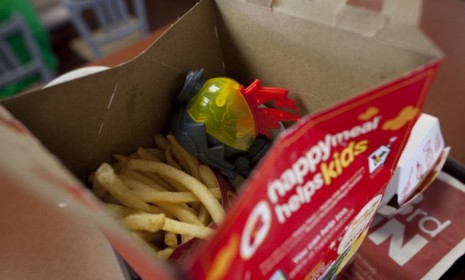The Happy Meal lawsuit: Is McDonald's 'baiting' children?
A California woman says her toy-crazy children are wheedling her into buying Happy Meals. Is that McDonald's fault — or hers?

A free daily email with the biggest news stories of the day – and the best features from TheWeek.com
You are now subscribed
Your newsletter sign-up was successful
California mother Monet Parham is suing fast-food giant McDonald's, alleging that it fraudulently uses the toys in Happy Meals to "bait" impressionable children and "interfere with and undermine parental control over the health and welfare of their children." Backed by the Center for Science in the Public Interest, Parham, 41, argues that McDonald's toy ads are responsible for her daughter's too-ceaseless-to-ignore demands for Happy Meals. Parham and CSPI don't want money, just an end to the Happy Meal ads. Is this lawsuit reasonable?
How about a "Whiny Meal" for Parham: By all means, "let this case go forward," says the New York Daily News in an editorial. If the courts agree that Parham is so "powerless" that she can't say no to feeding "such poison to her poor, poor dear" daughter, they can also rule her an unfit mother. Or perhaps McDonald's can introduce a toy for parents like her: "A rubber finger that can be used to point blame at anyone, everyone, but yourself."
"California mom failed to wean her daughter off Happy Meals..."
The Week
Escape your echo chamber. Get the facts behind the news, plus analysis from multiple perspectives.

Sign up for The Week's Free Newsletters
From our morning news briefing to a weekly Good News Newsletter, get the best of The Week delivered directly to your inbox.
From our morning news briefing to a weekly Good News Newsletter, get the best of The Week delivered directly to your inbox.
Happy Meals are like cigarettes: To understand the threat of McDonald's, says Libby Copeland in Slate's XX Factor, you have to look at the "ubiquity" of its restaurants and its message "particularly in certain poorer neighborhoods." This is arguably a public health issue. "To the extent that we restrict the advertising and sale of tobacco and alcohol products, particularly in relation to the young, we should be thinking about how we permit the mass dissemination of a message that promotes the consumption of really bad food."
Both sides have a case: Parham is right that kids 8 and under don't understand the "abstract and hidden form of enticement" in McDonald's toy-for-food pitch, says Margret Nickels at the Erikson Institute, as quoted in the Chicago Tribune. When they see a desirable toy, they become incapable of making rational nutrition choices. But that's the kids: Helping toy-crazy daughters "cope with limits and frustrations" is "part of the role of good, caring parents," not the courts.
"Happy Meal suit raises more than food, marketing questions"
A free daily email with the biggest news stories of the day – and the best features from TheWeek.com
-
 Film reviews: ‘Send Help’ and ‘Private Life’
Film reviews: ‘Send Help’ and ‘Private Life’Feature An office doormat is stranded alone with her awful boss and a frazzled therapist turns amateur murder investigator
-
 Movies to watch in February
Movies to watch in Februarythe week recommends Time travelers, multiverse hoppers and an Iraqi parable highlight this month’s offerings during the depths of winter
-
 ICE’s facial scanning is the tip of the surveillance iceberg
ICE’s facial scanning is the tip of the surveillance icebergIN THE SPOTLIGHT Federal troops are increasingly turning to high-tech tracking tools that push the boundaries of personal privacy